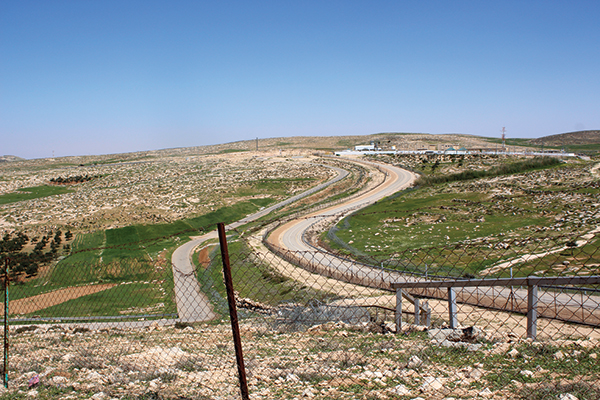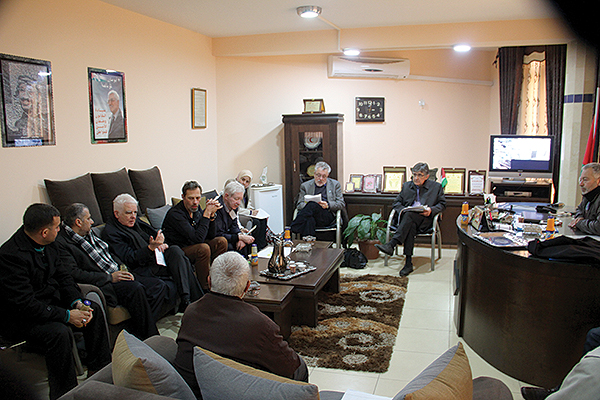
The Israeli Civil Administration’s (ICA) practice of planning in Area C of the occupied West Bank has been strongly criticised by leading professional planners from abroad. A report by a five-strong International Advisory Board (IAB) of experienced planners from the UK, Germany, South Africa, and Canada calls for an end to demolitions and for plans for Palestinian communities in Area C to be approved.1
The Board was invited by UN-Habitat to look at the current impasse in planning in Area C. Under the Oslo Accords, the ICA is (temporarily) the agency with ultimate responsibility for regional and local planning in Area C. However, only three plans have been approved for Palestinian communities, and many others have been stalled for years. Without ICA-approved local-scale plans for Palestinian villages, development is unauthorised and enforcement action is taken: properties are demolished and planned developments funded by donor agencies are put on hold. Bedouin and herder communities are particularly at risk because of their semi-nomadic way of life.
The ICA says that the poor technical quality of the Palestinian plans is the reason for the delays and rejections of plans. However, after looking at a sample of ten such plans and visiting a number of the affected villages, IAB has come to the view that the plans are adequate and should be approved. This would enable villagers to undertake lawful development of their land and properties and remove the fear of demolition.
The report comments on the very high rate of demolitions in Area C, typically around 500 a year. The international experts make comparisons with the much more limited use of demolition in their own countries, where such action is seen as a “last resort”. Where unauthorised development takes place, it is usually resolved through negotiation – or may be seen as not so serious as to require demolition. The IAB report says “It is simply not credible that each year in Area C, in what are largely poor and marginalised village communities, there are over 500 unauthorised Palestinian developments that have such a deleterious impact that the only remedy has to be demolition, often entailing the eviction of families from their homes and/or severely damaging livelihoods.”
The Board also comments on the marked discrepancy between the lack of approval of these Palestinian plans and the expeditious process by which the ICA approves plans for new Israeli settlements in Area C. These Israeli settlements are illegal under international law. However, some 340,000 Israeli settlers now live in approximately 135 Israeli settlements, and there are another one hundred settlement “outposts” in Area C (not including East Jerusalem). The IAB notes that “The Israeli settlements get preferential access to water resources, and their residents are offered financial incentives to locate there by the Israeli government (e.g. housing subsidies). While outposts are typically ‘unauthorised development’ in terms of statutory plans, they rarely face demolition of their illegal structures.”
Denial of Administrative Justice
The IAB report is very critical of how the ICA delivers planning in Area C, stating that it amounts to a denial of administrative justice. The concept requires that administrative systems operated by states safeguard the rights and interests of individuals affected by those systems, have fair processes, and deliver just outcomes. Good administrative justice requires states to:
- make users and their needs central, treating them with fairness and respect at all times;
- enable people to challenge decisions and seek redress using procedures that are independent, open, and appropriate for the matter involved;
- keep people fully informed and empower them to resolve their problems as quickly and comprehensively as possible;
- lead to well-reasoned, lawful, and timely outcomes;
- be coherent and consistent;
- work proportionately and efficiently;
- adopt the highest standards of behaviour, seek to learn from experience, and improve continuously.2
International Advisory Board Listening to the Village Leaders in Ras Tira and Daba, North of Qalqilyia, February 2015.
The report points to a number of ways in which planning in Area C currently falls short on these criteria. For example, there is a lack of transparency in the use of criteria by which plans are evaluated by the ICA. The criteria are not published on the web in Arabic, but rather are explained verbally at the first meeting between the ICA and the planning consultants preparing plans. Similarly, the customary lack of written comment and advice from the ICA following meetings about the preparation of plans is bad practice, as is the fact that the process for vetting and objection to plans is cumbersome and involves different committees. All this contributes to excessive delays in the determination of plans. The IAB further comments that “In the context of occupation, the right of settlers to object to plans for Palestinian villages is inappropriate, as is the lack of a Palestinian voice in decisions about plans in Area C.”
Why Planning Matters
Currently, about a third of Area C residents rely on farming and herding for their livelihoods. These are activities for which access to land and to water is essential. A quarter of residents work in Israel or in Israeli settlements – for these people transport matters to access employment opportunities. Rather than a restrictive land-use planning approach, Area C needs a form of planning that aims to drive rural development to lift people out of poverty and aid dependency.
The form and operation of the planning system is fundamentally entwined with the conflicts over land in the West Bank. At the local level, it affects the rights of every Palestinian household in Area C. However, at a more strategic level, planning is currently an obstacle to the economic development of the West Bank. Area C is fundamental to the infrastructure and connectivity of the West Bank, particularly for telecommunications, water, and transport. By preventing development of such networks to serve Palestinian homes and businesses, the planning system operated by the ICA acts as a barrier to economic opportunity and locks people into poverty.
The IAB was surprised that regional-scale plans drawn up a lifetime ago under the British Mandate are still used and carry statutory power. Thinking about regional development has changed greatly since the 1940s, when the focus was almost exclusively on urban containment and restriction of development outside villages.
Planning in Area C is preventing the proper development of the towns in Areas A and B. Denied adjacent land on which to expand, these towns are forced to cram new development inside their boundaries at ever higher densities. The functional city-region is now recognised as an important scale at which development needs to be integrated to secure benefits for both urban centres and their hinterlands. The IAB report suggests that the West Bank needs city-region plans. Similarly, the report backs the idea of a National Spatial Strategy, which the Palestinian Authority is working on, to set a strategic development framework to guide investment by the private sector, donor agencies, and local government.
♦ Planning in Area C should identify an adequate land supply to meet development needs over a five to ten year period and take a proactive approach towards infrastructure and connectivity. Plans need to identify and promote development opportunities.
The planners on the IAB put forward a vision for how planning should be done that is very different from the negative and restrictive practice of the ICA. The IAB says urban and regional planning “can be the means to coordinate investments spatially, to create synergies between investments in different sectors, to connect urban and rural areas into functional economic units, to build consensus amongst stakeholders, and to fashion a development path that is respectful of local needs and cultures.” Such an approach “has a key role to play in realising the ambitions of the Palestinian people, the Palestinian Authority, the World Bank, and donor agencies.”
18 Past Presidents of Royal Town Planning Institute Express Concern
Following the publication of the IAB report, eighteen Past Presidents of the UK-based Royal Town Planning Institute signed a letter in their personal capacities, expressing concern at the way planning is being done in Area C.3 This letter, sent to the RTPI’s magazine The Planner, read:
“We write to draw attention to the recent report to UN-Habitat on planning in the West Bank (http://unhabitat.org/planning-needs-to-change-in-the-occupied-west-bank-un-habitat/). The report gives the findings of an International Advisory Board of experienced planners, led by RTPI Past President Cliff Hague. It explains how planning is being used to block development and impede much-needed infrastructure investment in Palestinian villages, while facilitating the construction of Israeli settlements which are illegal under international law. As experienced planners, we are concerned at planning being used in this discriminatory way. We assert the need for planning practices to be fair, inclusive and enabling, and to be used as a means of building trust within and between communities.”

Use Planning to Deliver Human Rights
The fact that Israel has the responsibility for planning in Area C does not mean that it has to operate the planning system in the way in which it is currently conducting it. Community involvement is a central feature of most planning systems across the world. Decisions are taken locally, except where developments have impacts on a wider scale. The effective exclusion of Palestinians living in Area C from decisions about small-scale developments that have only local effects is unnecessary and inequitable. A system of Local Planning Councils, based on clusters of villages, should be reconstituted and given powers to decide on local outline plans and to issue building permits.
In Area C, planning needs to become – as it is elsewhere nowadays – an enabling process rather than a purely restrictive mechanism. This means ensuring an adequate land supply to meet development needs over a five to ten-year period, and a proactive approach towards infrastructure and connectivity. Plans need to identify and promote development opportunities.
The international community should continue to support the process of making local plans with the aim of getting comprehensive coverage in Area C. As suggested above, approval of plans should rest with the re-established Local Planning Councils. The plans should be reviewed every five years. However, to expedite the plan preparation and adoption process and to integrate development spatially, plans should be prepared for areas based on clusters of villages and the space between them.
Such reforms could create the basis for a planning system based on human rights. They could dramatically improve development opportunities not just in Area C, but in the West Bank as a whole.
» Cliff Hague is Emeritus Professor of Planning and Spatial Development at Heriot-Watt University, Edinburgh, Scotland, and a Past President of the Royal Town Planning Institute and of the Commonwealth Association of Planners. He chaired the International Advisory Group that reported on planning in Area C.
1. UN-Habitat, (2015), Spatial Planning in Area C of the Israeli Occupied West Bank of the Palestinian Territory: Report of an International Advisory Board, available at http://unhabitat.org/spatial-planning-in-area-c-of-the-israeli-occupied-west-bank-of-the-palestinian-territory/.
2. Administrative Justice and Tribunals Council, (2010), Principles for Administrative Justice, available at http://ajtc.justice.gov.uk/docs/principles_web.pdf.
3. Cliff Hague, (2015), 18 RTPI Past Presidents sign letter on planning in Palestine, Cliff Hague: Urbanization and Planning, available at http://www.cliffhague.com/index.php/component/k2/item/200-18-rtpi-past-presidents-sign-letter-on-planning-in-palestine



